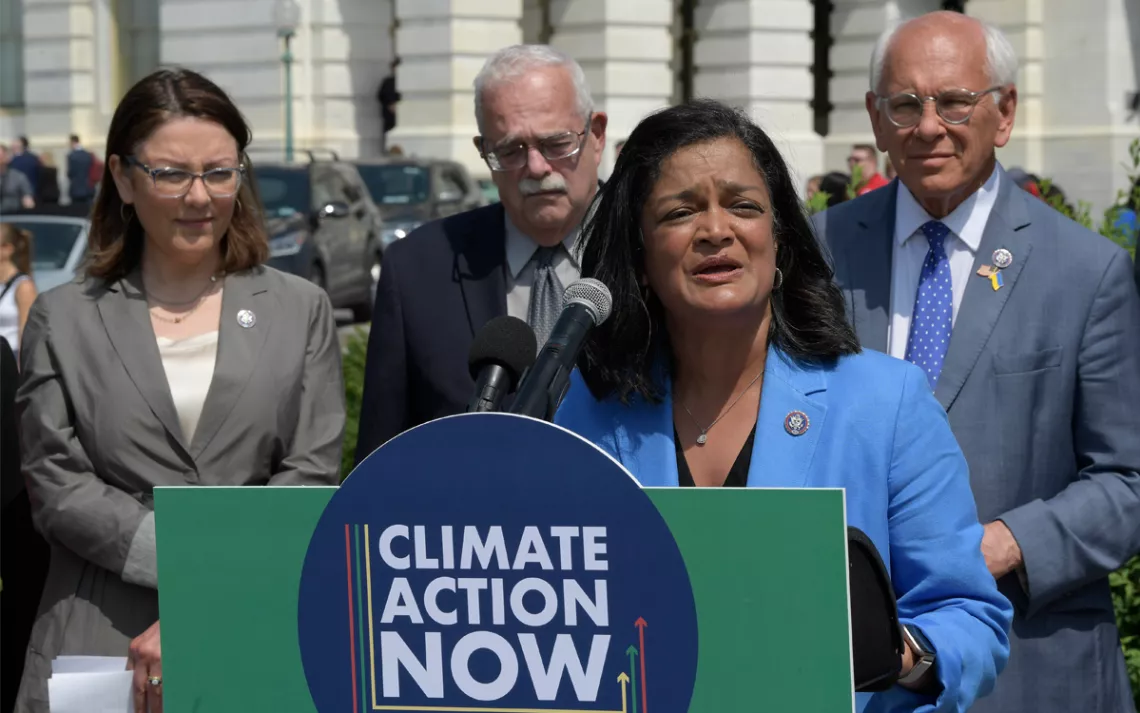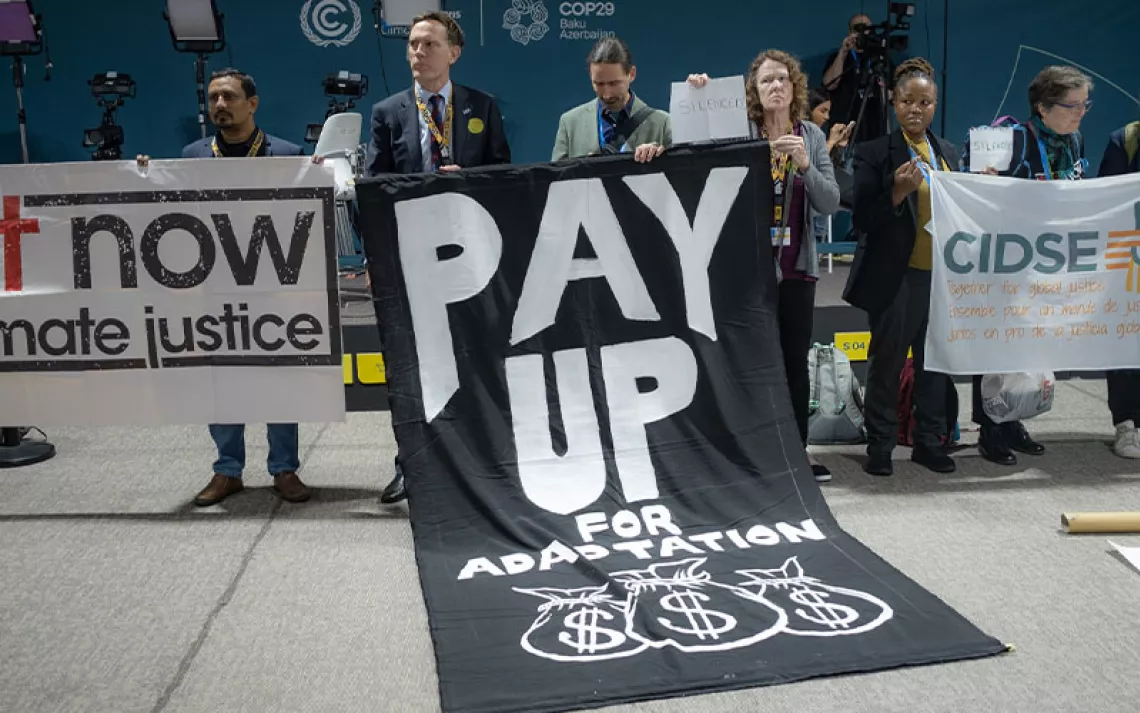Why Passing Climate and Energy Legislation Must Happen Now
Democrats have this summer for one last shot at climate action

US Representative Pramila Jayapal (D-WA). | Photo by Lenin Nolly/Sipa USA via AP Images
Stop me if you’ve heard this before. Democrats are hopeful that they can come to a deal on climate and energy legislation with West Virginia senator Joe Manchin, a grand bargain that would result in hundreds of billions of dollars in clean energy investment that could put the country a little further down the path to climate stability. But time is running out, and environmentalists are worried a deal could slip away.
That narrative has been one of the dominating scripts in Washington, DC, for close to a year now, as Democratic leadership has sought to bring along centrists in their caucus to pass a climate bill via the arcane “reconciliation” process. But the palace intrigue has grown increasingly tedious, like an absurd scene from the movie Groundhog Day; any new insight that could be gleaned from the headlines ended long ago. With talks in some form now more than a year old, numerous activists are growing disillusioned. It’s tiresome to try to live in Senator Manchin’s head.
But despite the tedium and the redundancy, the fact remains that this moment—this tiny window of time between now and the end of September—represents perhaps the last, best chance to put into federal law a massive investment in renewable energy and clean manufacturing that would accelerate the break from fossil fuels. “I’m very optimistic that we can reach agreement here,” Minnesota senator Tina Smith, a Democrat, said during a virtual climate event in May. But she warned, “Time is not our friend.”
The never-ending backroom negotiations over a broad piece of climate and energy legislation continue, this time in a one-on-one fashion between Manchin and Senate majority leader Chuck Schumer, the New York Democrat. The legislation is no longer marketed predominantly as a climate bill, since the White House is keen to couch the initiative in energy security and inflation-fighting terms, both as a political imperative and as a way of warming up Manchin.
Nevertheless, the contours of the climate package remain largely intact, at least in broad strokes. Some of this may sound wonky, but make no mistake: Our best chance of avoiding even more dangerous climate change rests on whether these wonky details get passed into law.
The bulk of the climate and energy investments will come in the form of clean energy tax credits, somewhere between $300 and $500 billion that would lower the cost of solar, wind, geothermal, energy storage, and transmission lines. Unlike the on-again, off-again tax credits that face expiration every few years, these could last for a decade. The tax credits could save Americans $5 billion annually in lower electricity costs beginning in 2024 as a result.
“It's the center of negotiations on the energy pieces” of the reconciliation package, said Melinda Pierce, legislative director for the Sierra Club. “The question is what's going to get nibbled away. You can do a whole lot of good or harm by just messing with the numbers there.”
Another important provision would be tax incentives for clean manufacturing. Amid a fossil fuel supply crisis, which has resulted in soaring prices, it should be the best of times for solar and electric vehicle manufacturers. But one frustrating theme over the past year has been snarled supply chains for all sorts of goods—and that includes semiconductors, chips, metals, batteries, and other equipment that goes into an array of clean energy technologies. The United States has already ceded clean energy supply chains to Asian manufacturers, but the reconciliation package includes incentives to set up new factories in the United States to build solar panels, wind turbines, heat pumps, and batteries. On the plus side politically, this is the type of initiative—more homegrown manufacturing—that will appeal to Manchin.
“Other nations around the world—particularly China, and in Europe—are moving towards clean energy, and seeking to lead the world in building electric vehicles, solar and battery technologies, and other clean energy industries that will dominate the global economy,” Sam Ricketts, a cofounder of the climate policy and advocacy group Evergreen Action, told Sierra. “The US has to step up its game, or else it risks trading a dependence on global oil markets, controlled by Russia and Saudi Arabia, for global clean technology markets dominated by China and other geopolitical rivals.”
A third element in a possible deal includes tax credits for electric vehicles. Existing federal tax credits of $7,500 are already winding down and have expired for major automakers like Tesla and GM. The Democrats hope to restore those tax credits and throw in additional incentives for EVs made by union labor, which were added into last year’s bill.
This is where things get tricky. Senator Manchin has strongly opposed the union bonus and has questioned the EV tax credits altogether, so their fate is unclear. “There's a waiting list for EVs right now with the fuel price at $4,” Manchin said in April. “But they still want us to throw $5,000 or $7,000 or $12,000 credit to buy electric vehicles. It makes no sense to me whatsoever.”
Meanwhile, Senator Tom Carper, a Democrat from Delaware, has been negotiating with Manchin over placing a fee on methane released by oil and gas drillers, a highly potent greenhouse gas. Frackers are releasing gargantuan volumes of methane into the atmosphere with near impunity, and experts say that slashing methane is one of the most impactful actions we can take to limit global warming. Unsurprisingly, oil lobbyists—led by Western Energy Alliance and the Independent Petroleum Association of America—are working behind the scenes to derail the methane fee.
Carper has hinted that he has smoothed over some of Manchin’s concerns, but nothing is final. One thing working in favor of the methane fee is that it would raise revenue for the US Department of the Treasury, rather than cost it money. One of Manchin’s broad concerns is the budget deficit, so it would seem that a revenue raiser would earn extra points for him.
A variety of other policy initiatives could move the needle on climate, some more speculative than others. But it’s difficult to know what exactly will appear in the final legislation, as the meetings between Manchin and Schumer have been conducted behind closed doors, with very few details leaking out.
At least this much is clear: The talks have become more substantive, with the two senators going “line by line over what a possible deal will look like,” Politico reports. That sort of specificity suggests there is progress and some momentum, rather than vague negotiations about a broad framework. Schumer is also working with the parliamentarian of the Senate over some of the procedural hurdles the Senate will need to get through over the next few weeks and months, another sign that the Democrats are serious about passing legislation into law.
That’s the good news. The bad news is that Manchin is going to exact a pound of flesh, likely in the form of new fossil fuel incentives. Also, he apparently opposes direct payments to companies building new clean energy projects, according to Politico, a provision intended to lower the upfront hurdles of building massive amounts of solar and wind while also making it easier for companies to access those subsidies.
Such concessions to a coal state senator will likely disappoint many environmentalists. But the fact is that this is the last train leaving the station, America’s final shot at climate action, most likely until later this decade.
“Last fall the House passed $555 billion in climate investments. And the climate crisis demands urgent action, with all of those investments and more, to cut carbon pollution and build a clean energy economy,” Ricketts said. “A deal seems imminently possible, but the US Senate must get a move on to finalize a package of clean energy investments this summer.”
The pleas from renewable energy companies, automakers, environmental groups, lawmakers at the state level, and congressional Democrats to pass a reconciliation bill centered on climate and energy is becoming more feverish. On June 15, a group of 175 Democratic House members sent a letter to President Biden, urging him to do everything within his power to clinch a deal on the climate investments. That is, a deal that will address multiple crises at once—jobs, inflation, energy security, and, of course, climate.
“The climate investments in the House-passed reconciliation package would provide the long-term antidote to both the energy crisis and the inflation crisis our nation currently faces,” the letter states. “These investments would help transition all sectors of our economy to a clean future with good jobs and environmental justice at its heart” and “trigger a boom in advanced energy manufacturing of a wide range of technologies that can be made in America with American labor.”
The letter was signed by the leaders of the Congressional Progressive Caucus and, notably, the New Democratic Coalition, a faction of centrists Democrats.
“We have 99.9 percent of people in the Democratic Party ready to do this,” said Progressive Caucus chair Pramila Jayapal, from Washington, according to E&E News. “Let’s move it forward.”
“Clearly, as we approach this summer, there is a looming deadline before we move from serious policy work in the Senate to just politics. So it's crunch time now,” Pierce said.
 The Magazine of The Sierra Club
The Magazine of The Sierra Club



